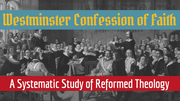|
1. They, whom God hath accepted in His Beloved, effectually called, and sanctified by His Spirit, can neither totally, nor finally, fall away from the state of grace: but shall certainly persevere therein to the end, and be eternally saved.(a) (a) Phil. 1:6; II Pet. 1:10; John 10:28, 29; I John 3:9; I Pet. 1:5, 9. 2. This perseverance of the saints depends not upon their own free will, but upon the immutability of the decree of election, flowing from the free and unchangeable love of God the Father;(b) upon the efficacy of the merit and intercession of Jesus Christ;(c) the abiding of the Spirit, and of the seed of God within them;(d) and the nature of the covenant of grace:(e) from all which ariseth also the certainty and infallibility thereof.(f) (b) II Tim. 2:18, 19; Jer. 31:3. (c) Heb. 10:10, 14; Heb. 13:20, 21; Heb. 9:12, 13, 14, 15; Rom. 8:33 to the end; John 17:11, 24; Luke 22:32; Heb. 7:25. (d) John 14:16, 17; I John 2:27; I John 3:9. (e) Jer. 32:40. (f) John 10:28; II Thess. 3:3; I John 2:19. 3. Nevertheless, they may, through the temptations of Satan and of the world, the prevalency of corruption remaining in them, and the neglect of the means of their preservation, fall into grievous sins;(g) and, for a time, continue therein:(h) whereby they incur God’s displeasure,(i) and grieve His Holy Spirit,(k) come to be deprived of some measure of their graces and comforts,(l) have their hearts hardened,(m) and their consciences wounded,(n) hurt and scandalize others,(o) and bring temporal judgments upon themselves.(p) (g) Matt. 26:70, 72, 74. (h) Ps. 51 title and ver. 14. (i) Isa. 64:5, 7, 9; II Sam. 11:27. (k) Eph. 4:30. (l) Ps. 51:8, 10, 12; Rev. 2:4; Cant. 5:2, 3, 4, 6. (m) Isa. 63:17; Mark 6:52; Mark 16:14. (n) Ps. 32:3, 4; Ps. 51:8. (o) II Sam. 12:14. (p) Ps. 89:31, 32; I Cor. 11:32.
0 Comments
Your comment will be posted after it is approved.
Leave a Reply. |
About the StudyFor nearly 375 years, the Westminster Confession of Faith has been the standard of Reformed theology around the world. It is right and proper for Reformed Christians to study the Confession our ancestors wrought so many centuries ago. Table of Contents
All
|

